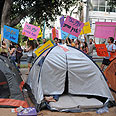
Tel Aviv needs the young
Op-ed: Don’t tell young Israelis to leave Tel Aviv; without them it will become a boring, ugly city
Alongside the general support for the tent protest, which started in central Tel Aviv and appears to spread to other regions nationwide, we cannot ignore the criticism directed at the young people gathered on Rothschild Boulevard. They are being labeled as “spoiled” for seeking affordable housing at the center of Israel’s most expensive city.
“Not everyone has to live at the center of the largest cities; why don’t they look for apartments on the outskirts of Tel Aviv or even in Ashkelon?” say the critics, who note that housing is not affordable to everyone at the downtown core of large cities worldwide.
Yet what these critics apparently forget is that when one studies in university, while trying to make ends meet by taking several odd jobs, and with car maintenance and fuel prices skyrocketing, and with public transportation that doesn’t provide comfortable, quick transport, the above “suggestions” are not realistic or financially sound.
Yet let’s assume for a moment that public transportation in Israel has become readily available and cheap overnight, and that housing prices in the towns around Tel Aviv have become especially attractive, and that jobs are readily available – would we really want to see Tel Aviv, the city that never sleeps, emptying out of young people and turning into a city of luxury apartments owned by wealthy individuals, many of whom don’t even live there?
In order to respond to this question there is no need to travel forward in time – it would suffice to look at the grim state of Jerusalem, its ghost neighborhoods, its sons and daughters who flee a moment after completing their IDF service, the dwindling selection of entertainment and leisure venues, and the difficulties inherent in turning the capital into a magnet for young tourists.
Finding the balance
Economics is not just about immediate gain or loss - huge real estate profits, which are only measured in the short term, may destroy the fabric of life in Israel’s main cities and make them unattractive in the long run. What turns Tel Aviv, Jerusalem or Haifa into cities that offer worthwhile real estate investment is their unique character and life – the kind of life that cannot exist without a young population with relatively limited means.
In order to maximize the value of assets in the large cities, a balance must be maintained between the resources derives from the wealthy and the creation, cultural, leisure and lifestyle of population groups that are economically weaker.
Cities that only offer huge luxury apartments worth millions of dollars, while their owners live elsewhere, cannot be “cities that never sleep.” The mayors of large cities must join forces with the young protestors and take the lead in the struggle to build small apartments downtown and change the designation of land in favor of rentals – while foregoing some municipal fees in favor of creating a diverse, lively fabric of life.
Without Israel’s most powerful mayors and local authorities joining forces, and without utilizing their power and political connections, it is doubtful whether the bureaucracy and government cumbersomeness can be defeated. If each mayor works on behalf of himself, and each minister promotes his own reform, and each Knesset member visits the protest tent at his spare time, this important struggle may be for naught.
So before we evict the tent city from Rothschild and advise its dwellers to move to Rishon LeZion or Netanya, we should keep in mind that Tel Aviv needs them no less than they need it, and that without them it may turn into a boring, ugly and ordinary city.
Orna Angel serves as Vice President of Planning at Shikun and Binui
- Follow Ynetnews on Facebook










